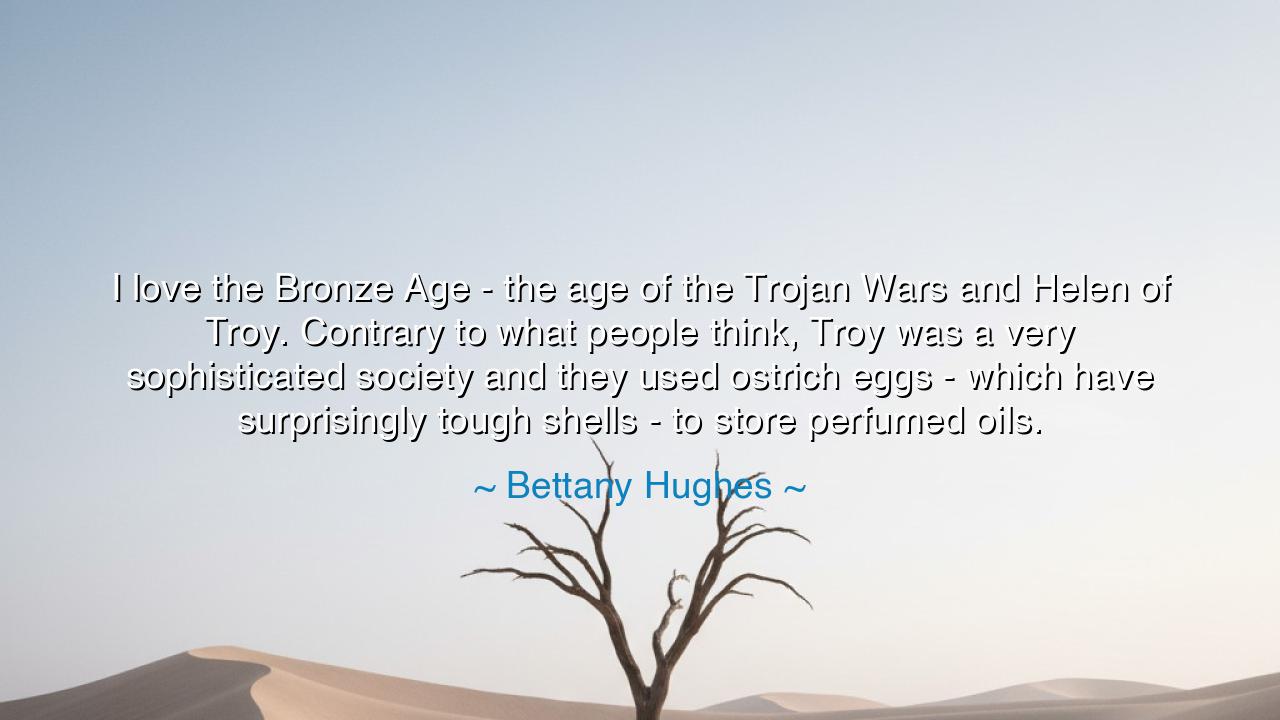
I love the Bronze Age - the age of the Trojan Wars and Helen of
I love the Bronze Age - the age of the Trojan Wars and Helen of Troy. Contrary to what people think, Troy was a very sophisticated society and they used ostrich eggs - which have surprisingly tough shells - to store perfumed oils.






In the words of Bettany Hughes, “I love the Bronze Age—the age of the Trojan Wars and Helen of Troy. Contrary to what people think, Troy was a very sophisticated society and they used ostrich eggs—which have surprisingly tough shells—to store perfumed oils.” These words, spoken by a historian who has devoted her life to uncovering the wisdom of the ancient world, remind us that the past is not primitive, but profound. The Bronze Age, often imagined as a time of swords and simplicity, was in truth a golden dawn of civilization—a time when humanity learned to dream, to trade, to build, and to tell stories that still echo across the ages. Hughes’s words are a call to humility, a reminder that the roots of our modern world lie in the brilliance of those who lived thousands of years before us.
The Bronze Age, stretching roughly from 3300 to 1200 BCE, was a time of wonder and awakening. It was the age of heroes, of builders and dreamers, of seafarers who crossed unknown waters to trade bronze, gold, spices, and wisdom. In this era arose the city of Troy, immortalized in the poems of Homer, where Helen of Troy, “the face that launched a thousand ships,” became the symbol of beauty and the power it could wield. Yet, as Hughes reminds us, Troy was more than a city of war—it was a center of culture and sophistication. Its people crafted music and art, designed fortresses that touched the sky, and traded goods from Egypt to Mesopotamia. The ostrich eggs used to hold perfumed oils stand as a delicate testament to this refinement—a small but shining symbol of how the ancient world blended practicality and beauty.
In the ostrich egg, we find metaphor as well as history. The egg, born from the wild deserts of Africa and brought to Troy through trade, carried within it the essence of many worlds. It was both fragile and enduring—just as civilization itself is. Its tough shell, polished and carved to hold perfumed oils, embodied the harmony between nature and human ingenuity. To store precious oils in such vessels was not merely functional—it was an act of reverence. It showed that even in their daily lives, the Trojans sought grace and meaning. They saw beauty not as luxury, but as a way of life.
The Trojan War, as told by Homer, may have been a tale of blood and betrayal, but beneath its battles lies the heartbeat of an age striving toward greatness. The warriors who fought were not savages—they were poets and lovers, bound by ideals of honor and glory. Even in the midst of destruction, their society valued art, trade, and beauty. They understood what we too often forget—that civilization is not measured by its wars, but by what it chooses to preserve and create. Hughes’s admiration for this era springs from that very truth: that human greatness shines brightest when it marries strength with sophistication, passion with purpose.
Consider the archaeologist Heinrich Schliemann, who in the nineteenth century, guided by little more than faith in Homer’s words, unearthed the ruins of Troy. When he found the layers of walls, the treasures of gold, and the traces of long-lost culture, the world was forced to confront the truth: the stories of the ancients were not mere myth. They were windows into a world more advanced, more intricate, and more human than we had imagined. The ostrich eggs, the jewels, the amphorae—all whispered of a people who lived with imagination and intention, who understood that even the smallest artifact could carry the fragrance of eternity.
From this, a lesson emerges that transcends time: do not underestimate the wisdom of those who came before you. Modernity may give us speed, but the ancients teach us depth. They remind us to honor beauty in the everyday, to value craft and care over haste and convenience. The Trojans, the Egyptians, the Minoans—they built not merely to survive, but to leave behind echoes of their spirit. If they could transform an ostrich egg into art, then surely we, too, can transform the simple acts of our lives into works of meaning.
So, my child, listen well to Bettany Hughes’s words. Love the Bronze Age, for it is the mirror of our own beginnings. Do not see it as distant or inferior, but as a teacher whispering across millennia. Learn from its harmony of might and mind, its reverence for beauty, its belief that every vessel, every wall, every word can hold something sacred. For though the ages rise and fall, the essence of humanity remains: we are all striving, as the Trojans once did, to turn the fragile shells of our existence into vessels of light.






AAdministratorAdministrator
Welcome, honored guests. Please leave a comment, we will respond soon